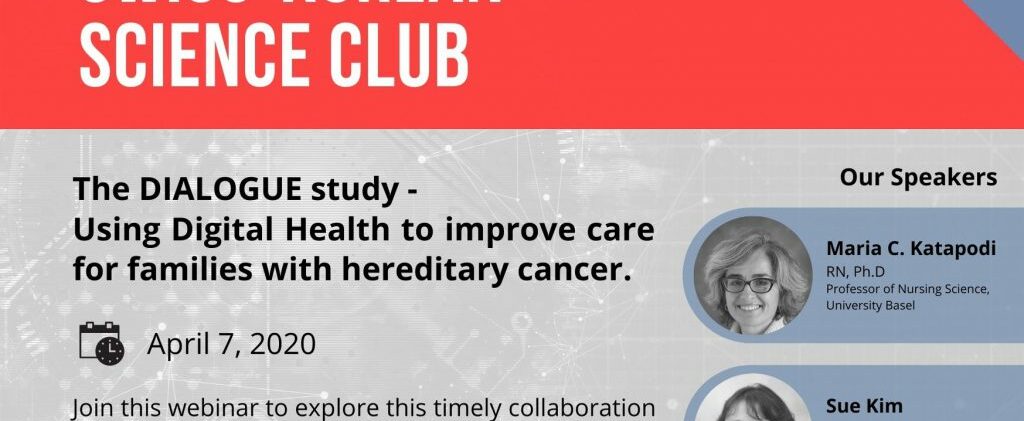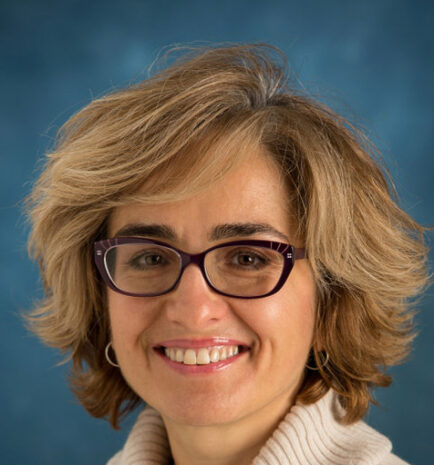
This month's speakers
-
![]()
Bio
Maria C. Katapodi, RN, Ph.D
Professor of Nursing Science, University BaselMaria Katapodi received her BS degree from National and Kapodistrian University of Athens, Greece, and her MSc and PhD from the University of California, San Francisco (UCSF), USA.
Over the past 20 years her scholarship has been in alignment with personalized healthcare and public health genomic interventions in hereditary breast and ovarian cancer (HBOC) and Lynch syndrome. During her tenure at the University of Michigan she developed and tested public health and family-based interventions designed to improve awareness of hereditary cancer risk and use of cancer genetic services. Her work includes collaboration with the Michigan Department of Health and Human Services for a statewide outreach and recruitment of families with high suspicion of HBOC in an efficacy randomized trial, and development and testing of the Family Gene Toolkit for family communication about hereditary cancer risk. Since
moving to Switzerland in 2014, Maria established the Swiss Cancer Predisposition Genetic Screening Consortium and the CASCADE Study, a Swiss-wide multidisciplinary initiative aiming to enhance translation of genetic and genomic discoveries into public health and clinical interventions. -
![]()
Bio
Sue Kim, RN, Ph.D
College of Nursing, Yonsei UniversitySue Kim received her BS from Ewha Womans University, Seoul, Korea, followed by MS at Columbia University, New York, where she was trained as a women’s health nurse practitioner.
She obtained her PhD at the University of California, Los Angeles (UCLA), and received postdoctoral training in the area of community-based participatory research. Following teaching at the University of Virginia, Charlottesville, USA, she is currently Professor at Yonsei University, College of Nursing, Seoul, Korea. With expertise in qualitative research and mixed methods, she is also a core member of the Korean Nurses’ Health Study, a national cohort study, since its inception. Dr. Kim’s area of research includes cancer survivorship, especially for women’s cancers, and family adjustment during cancer. Her work includes lifestyle interventions to alleviate cancer-related fatigue and development of an evidence-based guidebook for children’s adjustment following cancer diagnosis of the mother, the first of its kind in Korea.
The DIALOGUE study – Using digital health to improve care for families with hereditary cancer
Summary
In Hereditary Breast and Ovarian Cancer (HBOC) syndrome communication of genetic test results with relatives is essential to cascade genetic screening, in order to propose preventive
and other clinical management options that reduce morbidity and mortality. However, empirical evidence suggests that up to 50% of biological relatives are unaware of relevant genetic information, suggesting that potential benefits of genetic testing are not communicated effectively.
This study is a collaboration between Swiss and Korean researchers to support the communication of cancer risk among families with HBOC, mainly in two areas. Firstly, developing the K-CASCADE research infrastructure in Korea by expanding an existing research infrastructure developed by the CASCADE Consortium in Switzerland. This research infrastructure will enable future collaborative projects between the two countries. Secondly, the DIALOGUE study, which will develop and test a digital platform to support the communication of cancer risk in HBOC families, by providing information about cancer genetics and risk management, decision support, and enhance communication of genetic test results. The digital platform will be based on the Family Gene Toolkit, a web-based intervention that has been successfully tested for acceptability and participant satisfaction. Linguistic and cultural adaptation will be done for the Swiss and Korean population. The efficacy of the digital platform will be evaluated by measuring psychological distress, communication of genetic test results,
knowledge of cancer genetics, coping, and decision making. The RE-AIM format will also be applied to evaluate the reach, effectiveness, adoption, implementation, and maintenance of the digital platform.
Adapting existing interventions, rather than developing new ones, takes advantage of previous valid experiences without duplicating efforts. The study is extremely timely and relevant, given the expansion of genetic testing technology, the falling costs of genetic testing, and the increased pressure for integration of genetic knowledge in clinical care. The study would also be one of the first resource-effective international research platforms that can be scaled to large patient numbers and can be used in clinical practice.

